Per una sociologia della mobilità umana
Titolo Rivista MONDI MIGRANTI
Autori/Curatori Ettore Recchi
Anno di pubblicazione 2023 Fascicolo 2023/3
Lingua Italiano Numero pagine 21 P. 9-29 Dimensione file 380 KB
DOI 10.3280/MM2023-003001
Il DOI è il codice a barre della proprietà intellettuale: per saperne di più
clicca qui
Qui sotto puoi vedere in anteprima la prima pagina di questo articolo.
Se questo articolo ti interessa, lo puoi acquistare (e scaricare in formato pdf) seguendo le facili indicazioni per acquistare il download credit. Acquista Download Credits per scaricare questo Articolo in formato PDF

FrancoAngeli è membro della Publishers International Linking Association, Inc (PILA), associazione indipendente e non profit per facilitare (attraverso i servizi tecnologici implementati da CrossRef.org) l’accesso degli studiosi ai contenuti digitali nelle pubblicazioni professionali e scientifiche.
Gli studi sulle migrazioni possono essere divisi in due grandi filoni a seconda del loro oggetto precipuo: da un lato, la mobilità delle persone; dall’altro, la loro incorporazione nei luoghi di destinazione. Questa seconda tematica è preponderante, sia nel dibattito teorico e pubblico che nella ricerca empirica degli ultimi decenni. La mia attenzione si concentra invece piuttosto sulla pri-ma, sviluppando una sociologia della mobilità umana. Analiticamente, lo stu-dio della mobilità può assumere due prospettive distinte ancorché convergenti – una centrata sugli attori sociali, l’altra sui sistemi di regolazione. In questa nota, rendo conto in maniera sintetica delle ricerche da me promosse sulla re-golazione globale della mobilità transnazionale, e in particolare sulle condi-zioni di ottenimento dei visti di ingresso e sulla natura delle frontiere interna-zionali terrestri. I risultati di queste ricerche offrono nuove evidenze sulla di-visione del pianeta in un Nord e un Sud e mostrano ulteriori sfumature nella distribuzione delle chance di mobilità transnazionale e della libertà di circola-zione di cui godono gli individui su scala mondiale.
Parole chiave:mobilità umana; sociologia delle migrazioni; teoria sociologi-ca.
Ettore Recchi, Per una sociologia della mobilità umana in "MONDI MIGRANTI" 3/2023, pp 9-29, DOI: 10.3280/MM2023-003001